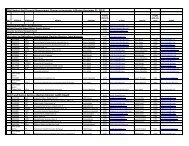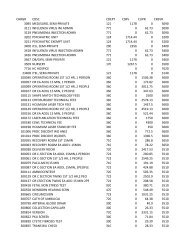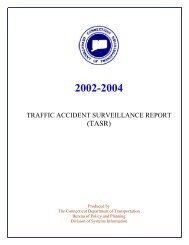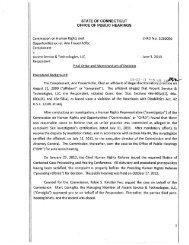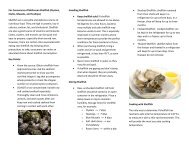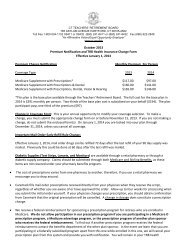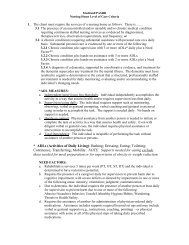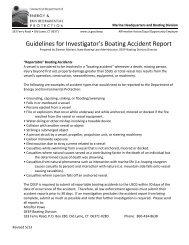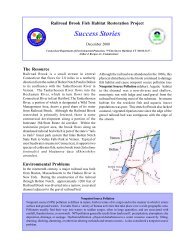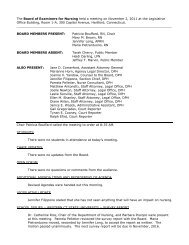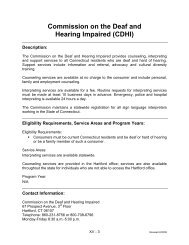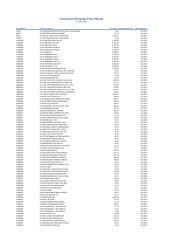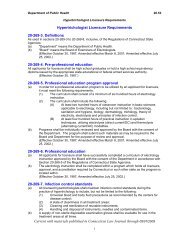Public Act 490 Guide - CT.gov
Public Act 490 Guide - CT.gov
Public Act 490 Guide - CT.gov
Create successful ePaper yourself
Turn your PDF publications into a flip-book with our unique Google optimized e-Paper software.
PA<br />
<strong>490</strong><br />
SE<strong>CT</strong>ION 14: FREQUENTLY ASKED QUESTIONS REGARDING PA <strong>490</strong><br />
Q What records should I keep?<br />
A It is very important that you keep accurate records<br />
of your PA <strong>490</strong> land. These records should include a copy<br />
of your original application with dates and signatures along<br />
with any supporting documents such as maps, reports,<br />
correspondence and field cards. It is also recommended<br />
that you check with the assessor periodically after the<br />
application has been accepted to make sure the updated<br />
information on your field card is accurate.<br />
QWhat is the most important item to understand<br />
about applying for PA <strong>490</strong> classification?<br />
A If you have owned the land less than ten years and it<br />
is classified as PA <strong>490</strong> land, there is a conveyance tax that will<br />
apply if the land is sold, transferred or land use has changed.<br />
You will have to pay this tax to the town. The recapture tax<br />
can be higher than the amount of property tax saved.<br />
QWhat is the Conveyance Tax and<br />
how does it work?<br />
A Once you place your property under PA <strong>490</strong> farmland,<br />
forest land or open space classification with your town,<br />
that property must remain so classified for 10 years or you<br />
will incur a penalty called the Conveyance Tax. The clock<br />
starts ticking for the conveyance from the time of ownership<br />
or time of classification, whichever comes earliest for<br />
farmland and forest land and from the time of classification<br />
for open space. The tax imposed for a sale, a transfer or a<br />
change in the land use and the tax will be 10% of sale price<br />
if sold within first year of classification, 9% if sold within<br />
2nd year of classification, etc., down to 1% if sold within<br />
10th year of ownership. No tax will be imposed following<br />
the end of the tenth year after the initial date of classification.<br />
This tax is in addition to the normal real estate<br />
conveyance tax (per Connecticut state statutes) that you<br />
must pay. The rate of the tax is applied to the sale price of<br />
the land in the case of a sale, or the fair market value of the<br />
land determined by the assessor in the case of a land use<br />
change or a non-exempt transfer for little or no consideration.<br />
The owner/seller is responsible for paying the<br />
conveyance tax. There are exemptions or excepted transfers<br />
to this listed under CGS Section 12-504c but if there are any<br />
questions, you should retain a land use lawyer.<br />
QIs there a definition of farming and agriculture<br />
accepted by everyone for use in PA <strong>490</strong><br />
classification?<br />
A Item 1-1q of the Connecticut General Statutes gives<br />
a definition of agriculture which is very diverse but which<br />
is accepted. However, the PA <strong>490</strong> classification is not to be<br />
granted to a “gentleman farmer” who may raise a few<br />
chickens, have a garden or a couple of horses strictly for<br />
his own use. In the broader context, this classification is<br />
meant for those farms that are practicing production<br />
agriculture, and each case merits its own inspection.<br />
QIf I have acreage classified under PA <strong>490</strong> and<br />
decide to take some land out for some other<br />
use, does my classification get taken away on<br />
the rest of the land?<br />
A No, but the original application should be revised to<br />
show the change. However, if land is taken out of the forest<br />
land classification and the remaining acreage falls below<br />
25 acres, the entire parcel would be declassified because it<br />
no longer makes the 25 acre minimum to qualify for PA <strong>490</strong><br />
forest land.<br />
QDoes a new owner of land that was under<br />
PA <strong>490</strong> classification by a former owner have to<br />
reapply for classification if he or she wants to<br />
continue the classification?<br />
A Yes, classification ceases when there is a sale, transfer,<br />
or a change in land use. In addition if land classified under<br />
PA <strong>490</strong> is sold, the assessor is required by law to notify the<br />
new owner of the benefits of PA <strong>490</strong>.<br />
Q<br />
The question I have regarding PA <strong>490</strong> is not<br />
clearly answered in the statute, where would<br />
I find the answer?<br />
A There is more than 40 years of case law on PA <strong>490</strong>.<br />
You would look to see if your situation or issue has been<br />
determined by the courts.<br />
32<br />
<strong>Public</strong> <strong>Act</strong> <strong>490</strong>: A Practical <strong>Guide</strong> and Overview • http://www.cfba.org/pa<strong>490</strong>guide.htm • Connecticut Farm Bureau Association



